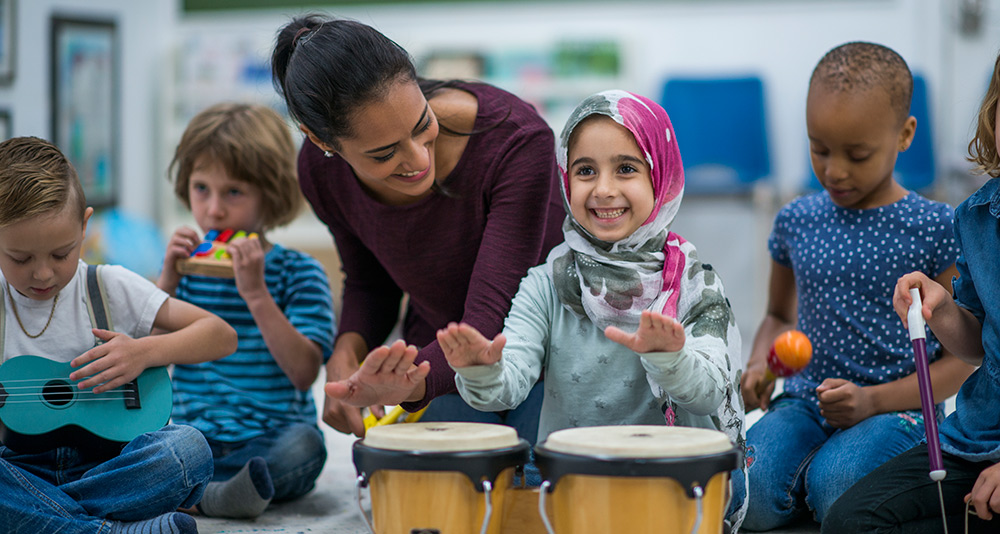
While educational systems have long stressed academic achievement and individual advancement, a growing movement is calling for an education of the heart. And that’s good news for all of us.
As Mind & Life Institute (MLI) strives to connect our support of contemplative research with real-world needs, education is now a critical theme. Our PEACE Grants, launched in 2017, support studies designed to promote prosocial behaviors and nurture wholesome qualities such as empathy, compassion, and altruism. Among the topics being explored by current grantees are racial bias in the classroom and the use of loving kindness meditation to alleviate stress among university students discussing social inequities.
How we educate today’s children to be compassionate, kind, and caring citizens was the focus of the 33rd Mind & Life Dialogue held in Dharamsala, India in March. Leading scientists, scholars, and teachers convened in this sacred setting to share their research and innovations with the Dalai Lama, invited guests, and an online audience numbering in the hundreds of thousands. Presentations at the event can be viewed on the Mind & Life website.
While in Dharamsala, I had the pleasure of interviewing a cross-section of our faculty. Below are six key takeaways with relevance for parents, teachers, school administrators, and policymakers.
- To raise healthy, learning-ready children, support the mental health of expectant and new mothers—Today’s health care systems focus primarily on the physical health of expectant mothers, with far less attention placed on their mental health during and after pregnancy. MLI Board Member Sona Dimidjian, Ph.D., Associate Professor of Psychology and Neuroscience at the University of Colorado Boulder, has been exploring the impact of contemplative practices on pregnant and postpartum women who are vulnerable to depression, specifically through the use of Mindfulness-based Cognitive Therapy. Over the course of an eight-week program, women focus their attention on daily activities such as eating, as well as on any difficult thoughts and emotions that arise. The program has proven effective in helping women maintain positive mental health, in part, through viewing their experiences through a wider perspective.
- Help educators to better manage stress and reconnect to their passion for teaching—Several of our presenters shared their work to equip teachers with mindfulness techniques aimed to alleviate stress. The result? “They [teachers] are more responsive to their students, and have a classroom environment that’s more emotionally positive, supportive, and safe,” said Patricia Jennings, Ph.D., Associate Professor at the Curry School of Education at the University of Virginia. With more than two decades of experience as a teacher and school director, Jennings knows all too well the pressure teachers face. Through her work, she helps educators keep their underlying ethical drive and passion for teaching alive.
- Combine today’s focus on social and emotional learning (SEL) with the teaching of contemplative practices—Robert Roeser, Ph.D., Professor of Human Development and Family Studies at Penn State University, has devoted much of his career to studying the impact of contemplative education on children. Through cultivating compassion, attention and awareness, empathy, and perspective taking, such methodologies equip children with practical skills that contribute to their success over a lifetime, he affirms.
- To increase attention and improve academic performance, cultivate mindfulness among students and educators—The fast pace of modern life and the all-consuming nature of our technological devices contributes to decreased attention spans. Through her research, Amishi Jha, Ph.D., Associate Professor of Psychology at the University of Miami, is finding that even short-form mindfulness practices of 15 minutes a day can help teachers better manage stress and undergraduate students improve their attention and avoid burnout.
- Nurture positive behaviors and an appreciation of our shared humanity—While social emotional learning programs emerged largely to prevent negative behaviors such as aggression and poor conduct at school, Kimberly Schonert-Reichl, Professor in Human Development, Learning, and Culture at the University of British Columbia, cites the increased emphasis on nurturing positive behaviors such as empathy, caring for others, and the ability to peacefully resolve conflicts.
Similarly, Sophie Langri and Tara Wilkie, Ph.D., co-founders of the Institute of Social and Emotional Education, stress the importance of nurturing human connection and emotional literacy among students. Their CS3 Framework is divided into three domains: Me, You, and Us. Teachers trained in the methodology gain tools for helping students develop not only self-awareness, but an appreciation of their relationship to and responsibility toward the wider community. With an understanding of humanity’s fundamental interconnectedness, students learn early-on the value of engaged citizenship.
- Engage and listen to young people whose voices and perspectives are critical to renewing educational systems—“When we talk about making a difference in children’s lives, we have to learn from them and ask what they think is going to help them have a positive life, to flourish and thrive,” said Schonert-Reichl. In her own work, Schonert-Reichl recently empowered 6th and 7th graders as researchers, who collected saliva samples as part of an experiment to explore epigenetic changes following a mindfulness program. The students learned about science while contributing their own perspectives to inform the process. Robert Roeser, too, sees great promise in more participatory, democratic, and student-led learning.
I was encouraged to hear these scholars and educators—many of them Mind & Life Fellows—describe their efforts to inform policymakers and influence larger systemic shifts in education. While the road to educational renewal is a long one, it’s dedicated researchers, educators, and social change champions like these who are leading the way forward.

